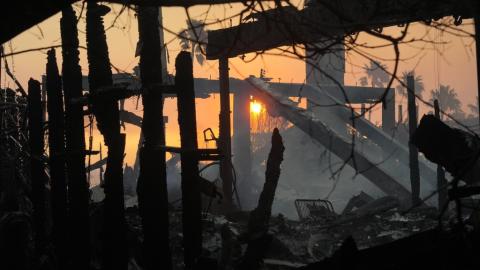Legal Pot Burning Through the Future of Colo. Youth?
DENVER -- Seven months have passed since Colorado stores began selling marijuana for recreational use. Money appears to be pouring in, but opponents say the negative consequences outweigh the economic benefits.
As the song goes, "They say the neon lights are bright on Broadway." There are neon lights in Denver but not to advertise a show.
These lights signal potential customers that pot shops are open for business. Green crosses and marijuana leaves dot the landscape on Broadway in the Mile High City.
"It's an antique store, maybe another antique store, and then a pot shop, and then another one for medical marijuana, and then another one for a pot shop," Colorado resident Ron Castagna explained, referring to Denver's Broadway.
"That's just not what our state should be about," he said.
Heading Down a Dangerous Path
One of Castagna's primary concerns is all the buzz attracts young people and can lead them down the wrong path. The former high school principal has witnessed the dangerous effects firsthand.
"Not only have I had them come to school high, now that we have e-cigarettes and vapor pens, we've pulled them out of classrooms - teachers being very aware of what's going on, thinking that a kid's mannerisms are more than just chewing on a pen. And all of sudden they get back there, and they see a student with an e-cigarette and a little bit of hash oil in there," Castagna elaborated.
Castagna was the principal of Lakewood High School for 17 years before recently retiring. Although he strongly believes that marijuana use hurts the education of students, his fight against legalization is about much more than making sure young people do well in the classroom.
"There isn't a life out there that's worth going down this road, whether it's alcohol, or marijuana, or tobacco," he said. "There's a price to pay for all of it, and the bigger story is, yes, there'll be some kids that will experiment with it; it's been going on for a long time."
"But our percentages are already up in the state of Colorado," he noted. "And the number of parents and folks that are doing this in their homes that are sending the wrong message, it's pretty clear-cut to me that this isn't a road that we want to go down."
Bob Doyle, the chair of Smart Approaches to Marijuana (SAM) in Colorado, said, "The danger is we have made marijuana use easier for kids, easier to conceal for kids, and we've made it more appealing for kids,"
"We have marijuana gummi bears, cupcakes, soda, vaporizers that deliver insanely potent marijuana that kids can conceal their use," Doyle said.
The Numbers Are In
Project SAM is a national movement working to counter the marijuana industry through education. As kids head back to school this fall, many might be shocked by the figures involving students in Colorado.
"Kids don't know the harms of marijuana," Doyle said.
"When you look at Denver, where most of the commercialization of marijuana has happened since 2009 in Colorado, almost a third of Denver's high school students are using marijuana. In the 10th and 12th grade, it's 50 percent higher than the national average - their marijuana use rates. Their 8th grade marijuana use rate is almost three times the national average," he said.
In other words, almost 20 percent of Denver's 8th graders smoke pot.
The state of Colorado surprised people around the world in November 2012, when residents voted to legalize recreational marijuana for adults 21 and over.
Supporters touted the tax revenue, but has it led to a financial boost for the state?
One report estimates the legal pot business bringing in around $11 million since shops opened in January. Another shows that tax revenues have not met expectations.
Financial benefits or not, Colorado residents like Doyle and Castagna believe the negatives are enough to repeal the legalization of marijuana.
They are a part of a growing organization working to get that measure on the ballot.
"The group is getting bigger and bigger as they see more and more of what's going on out there, and it crosses all walks of life and all types of people who are just concerned not just for our young people but for all of our society," Castagna told CBN News.
"I don't know how we can be productive and in the game when we're high," he said.




